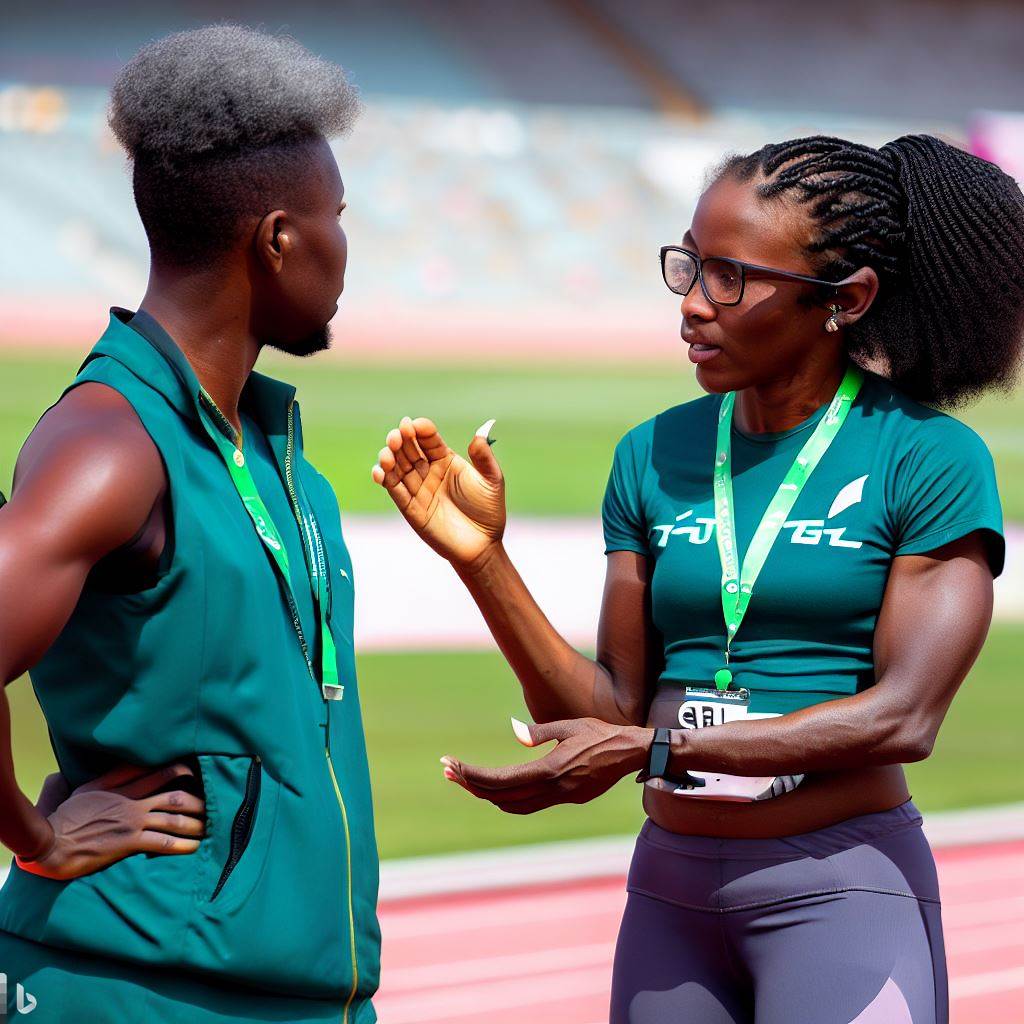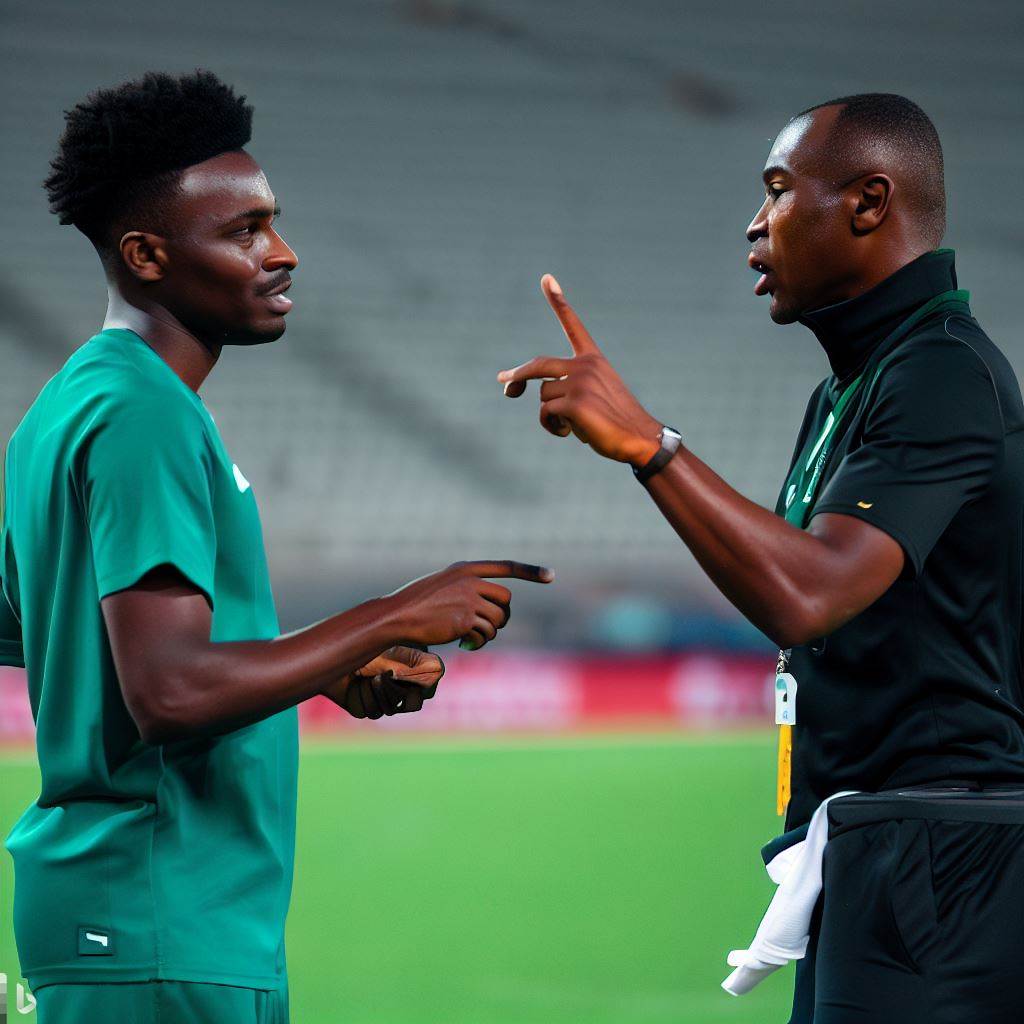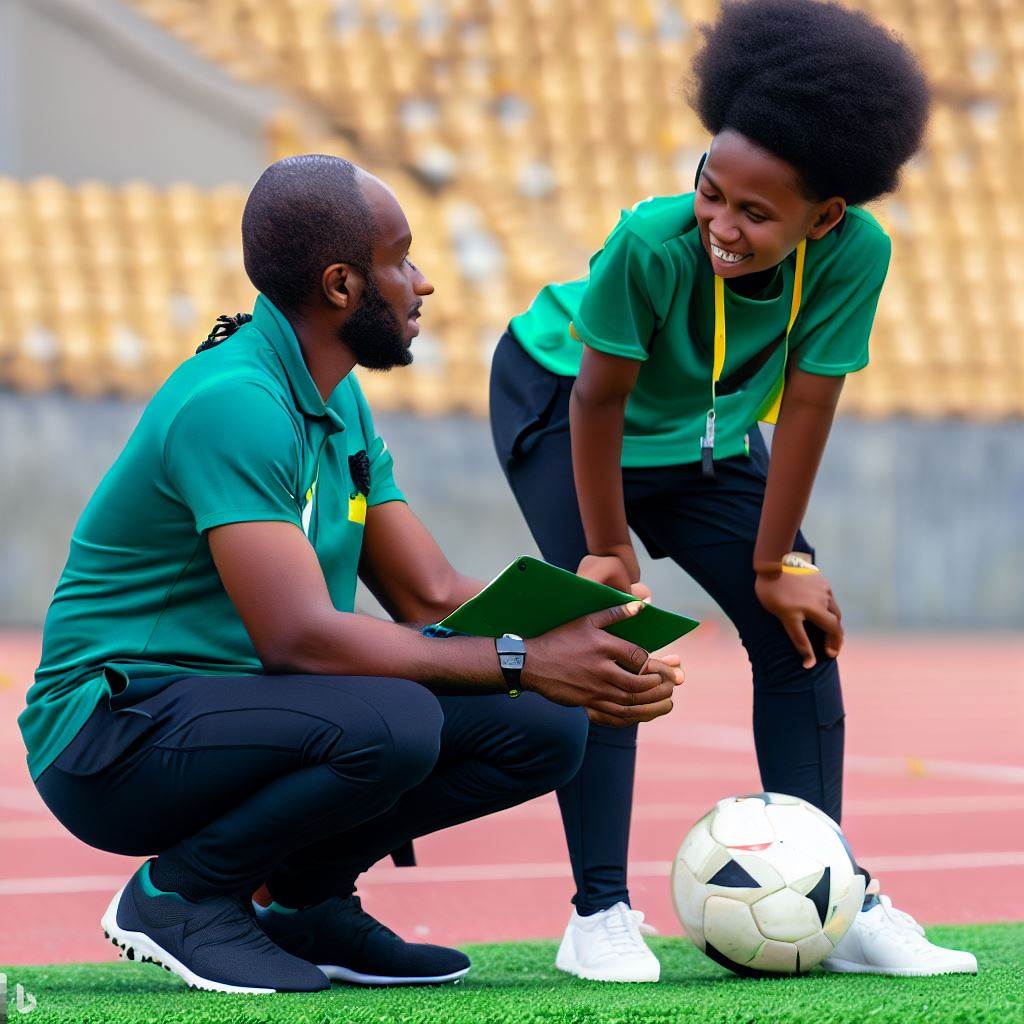Introduction
In Nigerian athletics, assistant coaches play a pivotal role in supporting athletes and enhancing their performance.
These coaches, who often work alongside head coaches, provide invaluable guidance, expertise, and motivation to help athletes reach their full potential.
Assistant coaches play a pivotal role in Nigerian athletics, serving as the unsung heroes behind the scenes.
Their significance cannot be overstated, as they contribute significantly to athlete development and performance improvement.
Here’s a concise overview of why assistant coaches are indispensable in the realm of Nigerian athletics:
- Skill Refinement: Assistant coaches specialize in honing specific skills, offering athletes tailored guidance for their unique needs.
- Mental Toughness: They provide emotional support, helping athletes navigate the pressures of competition and stay mentally resilient.
- Training Plans: Assistant coaches design comprehensive training programs, ensuring athletes reach their peak physical condition.
- Tactical Expertise: They develop strategic game plans, equipping athletes with the tools needed to outmaneuver opponents.
- Injury Prevention: Assistant coaches prioritize athlete safety, implementing injury prevention strategies to sustain long-term careers.
- Motivational Boost: They act as motivators and mentors, instilling confidence and determination in athletes.
- Performance Analysis: Using data and feedback, they fine-tune techniques, elevating an athlete’s overall performance.
In this article, we will delve deeper into the roles and impact of assistant coaches in Nigerian athletics.
The Role of Assistant Coaches in Nigerian Athletics
Assistant coaches play a vital role in Nigerian athletics, providing support and guidance to athletes alongside the head coach.
They have various responsibilities and tasks that contribute to the development and growth of athletes.
1. Skill Development
- Assistant coaches focus on specific skills and techniques, helping athletes improve their performance in various aspects of their sport.
- They provide individualized training and feedback to athletes, helping them refine their technique and reach their full potential.
- Assistant coaches work closely with athletes, identifying weaknesses and tailoring training programs to address those weaknesses.
2. Physical Conditioning
- Assistant coaches are responsible for designing and implementing strength and conditioning programs for athletes.
- They ensure athletes are physically fit and prepared for competitions by monitoring their diet, rest, and recovery.
- Assistant coaches guide athletes in proper warm-up and cool-down routines, minimizing the risk of injuries.
3. Mental Preparation
- Assistant coaches play a crucial role in the mental preparation of athletes, helping them build mental resilience and focus.
- They provide psychological support, teaching athletes coping strategies and helping them overcome performance anxiety.
- Assistant coaches motivate athletes, instilling confidence and belief in their abilities.
4. Strategy and Tactical Planning
- Assistant coaches assist in developing game plans, analyzing opponents, and strategizing for competitions.
- They study the strengths and weaknesses of opponents, helping athletes capitalize on opportunities during competitions.
- Assistant coaches provide in-game suggestions and adjustments, helping athletes make informed decisions.
5. Mentorship and Support
- Assistant coaches serve as mentors and role models for athletes, providing guidance on and off the field.
- They offer advice and support during challenging times, nurturing the mental and emotional well-being of athletes.
- Assistant coaches foster a positive team culture, promoting teamwork, sportsmanship, and discipline.
6. Talent Identification
- Assistant coaches are often involved in talent identification, scouting for potential athletes with raw abilities.
- They assess athletes’ potentials, identifying those who show promise and supporting their development.
- Assistant coaches provide recommendations to the head coach regarding the inclusion of athletes in the main team.
Basically, assistant coaches are crucial to Nigerian athletics as they play a multifaceted role in the development and growth of athletes.
They contribute by providing skill development, physical conditioning, mental preparation, strategy planning, mentorship, and talent identification.
Their dedication and expertise make them invaluable assets to both the athletes they support and the larger sports community.
Read: Legal Aspects of Assistant Coaching in Nigeria
Challenges faced by assistant coaches in Nigerian athletics
In Nigerian athletics, assistant coaches face numerous challenges that hinder their progress and potential.
These challenges include:
1. Lack of Recognition and Support
- Assistant coaches often do not receive the recognition they deserve for their contributions to the team.
- Their hard work and dedication are often overshadowed by the achievements of head coaches.
- They face a lack of support from sports organizations, which affects their morale and motivation.
- Without recognition and support, assistant coaches may feel undervalued and disheartened.
2. Limited Opportunities for Career Advancement
- Assistant coaches struggle to find opportunities for career advancement within the sports industry.
- They often remain in the same position for years, without any chances to move up the ladder.
- This limited growth potential can be frustrating and demotivating for assistant coaches.
- Without avenues for advancement, they may feel stagnant in their careers and seek opportunities elsewhere.
3. Lack of Professional Development
- Nigerian assistant coaches face a lack of access to professional development programs and resources.
- They struggle to improve their skills and knowledge due to limited training opportunities.
- The absence of workshops, seminars, and coaching clinics hampers their professional growth.
- Without adequate development, assistant coaches may struggle to keep up with evolving coaching techniques and strategies.
Despite these challenges, it is crucial for the sports industry to recognize the importance of assistant coaches and provide them with the necessary support and opportunities to thrive.
Here are some suggestions to address these issues:
1. Recognition and Support
- Sports organizations should acknowledge the contributions of assistant coaches and give them the recognition they deserve.
- Rewarding their achievements and highlighting their role can boost morale and motivation.
- Creating mentorship programs where experienced coaches can guide and support assistant coaches can also be beneficial.
2. Career Advancement
- The sports industry should create clear pathways for career advancement for assistant coaches.
- Organizations can establish promotion guidelines and opportunities for higher-level coaching positions.
- Providing financial incentives and job security can also encourage assistant coaches to stay in the profession.
3. Professional Development
- Investing in professional development programs for assistant coaches is crucial.
- Organizations can organize workshops, seminars, and coaching clinics to enhance their skills and knowledge.
- Collaborating with international coaching associations and inviting experienced coaches as guest speakers can provide valuable learning opportunities.
Lastly, assistant coaches in Nigerian athletics face significant challenges that impede their potential.
The lack of recognition and support, limited opportunities for career advancement, and inadequate professional development hinder their growth.
However, by addressing these issues and providing the necessary support and opportunities, the sports industry can empower assistant coaches and contribute to the overall success of Nigerian athletics.
Read: Networking Tips for Assistant Coaches in Nigeria
The potential impact of assistant coaches on Nigerian athletics
Assistant coaches play a crucial role in Nigerian athletics, contributing to the development and success of athletes.
These individuals have the potential to make a significant impact on the sport and should be nurtured and empowered to improve overall coaching standards in Nigeria.
The Importance of Nurturing and Empowering Assistant Coaches
- Knowledge and expertise: Assistant coaches bring their unique skill sets and experiences, enhancing the coaching staff’s overall knowledge base.
- Support system: Having assistant coaches provides a valuable support system for head coaches and athletes alike, allowing for more individualized attention and guidance.
- Mentorship opportunities: By nurturing assistant coaches, experienced head coaches can pass on their knowledge and mentor the next generation of coaches in Nigeria.
- Diversification of coaching methods: Assistant coaches often bring fresh perspectives and innovative training techniques, contributing to the evolution of Nigerian athletics.
- Workforce development: Investing in assistant coaches creates a pipeline of qualified coaches who can fill future coaching positions and sustain the growth of the sport.
The Success of Assistant Coaches and Higher Achievements in Nigerian Athletics
- Athlete development: Assistant coaches play a vital role in nurturing and refining athletes’ skills, ensuring their continuous progress and growth.
- Individualized training: With the support of assistant coaches, athletes can receive personalized training plans and attention, maximizing their potential.
- Specialized knowledge: Assistant coaches often specialize in specific areas such as strength and conditioning, technical skills, or psychological support, helping athletes overcome weaknesses.
- Enhanced team dynamics: Assistant coaches assist in fostering a positive team environment, promoting cohesion, and boosting athletes’ morale.
- Competition readiness: The involvement of assistant coaches allows for more thorough pre-competition preparations, raising the chances of success in national and international events.
- Long-term athlete development: Assistant coaches contribute to the holistic development of athletes, focusing not only on immediate results but also on long-term success and sustainability.
Assistant coaches serve as a valuable voice in Nigerian athletics, driving innovation, and skill development.
Nurturing and empowering these individuals will not only improve coaching standards but also translate into higher achievements for athletes.
By recognizing and investing in the potential impact of assistant coaches, Nigerian athletics can continue to thrive and succeed on the national and international stage.
Read: Top Skills Required for Assistant Coaches in Nigeria

Gain More Insights: Qualifications Needed for Sports Info Directors in Nigeria
Success stories of assistant coaches in Nigerian athletics
In Nigerian athletics, assistant coaches play a vital role in shaping the success of the athletes.
These unsung heroes often work behind the scenes, but their impact cannot be underestimated.
- John Obi, an assistant coach in long-distance running, helped train and mentor Olympian Ahmed Musa, who went on to win multiple gold medals in international competitions.
- Chioma Okonkwo, a sprinting specialist, worked closely with Blessing Okagbare. Under Okonkwo’s guidance, Okagbare became one of the fastest women in the world, breaking numerous records.
- Assistant coach Gabriel Oduah was instrumental in the success of the Nigerian women’s relay team. Through strategic training and tactical advice, Oduah helped the team win several medals in major championships.
- Emeka Anyanwu, an assistant coach in high jump, played a significant role in the development of Doreen Amata. Amata went on to represent Nigeria at the Olympics and set national records in high jump.
These are just a few examples of assistant coaches who have made significant contributions to the success of Nigerian athletes.
Their dedication, expertise, and relentless support have propelled athletes to new heights.
Inspiring stories of assistant coaches rising to prominent coaching positions
- Joseph Adeyemi started his coaching journey as an assistant at a local sports club. Through hard work and constant learning, he eventually became the head coach of the Nigerian national track and field team.
- Uzo Adigwe, initially an assistant coach for junior athletes, proved his mettle by identifying and nurturing talent. His exceptional coaching abilities led to his appointment as the head coach of a renowned Nigerian athletics academy.
- Caroline Nwachukwu began her coaching career as an assistant in a high school sports program. Over time, she excelled in developing athletes and eventually became a sought-after coach for elite Nigerian athletes.
- Emeka Ezeugo, a former national athlete, transitioned into coaching as an assistant coach. With his vast knowledge and experience, Ezeugo quickly rose to become the head coach of Nigeria’s senior athletics team.
These stories of assistant coaches rising to prominent coaching positions serve as an inspiration to aspiring coaches.
They highlight the importance of hard work, dedication, and a passion for the sport.
Assistant coaches are the unsung heroes behind the success of Nigerian athletes.
They deserve recognition for their contributions and tireless efforts.
As Nigerian athletics continues to grow and strive for excellence on the global stage, assistant coaches will remain an integral part of the journey.
Their knowledge, guidance, and support empower athletes to reach their full potential and achieve remarkable feats.
Read: Assistant Coach: A Key to Nigerian Basketball Rise
Recommendations for improving the status of assistant coaches in Nigerian athletics
- Establish a clear pathway for career progression for assistant coaches, including opportunities for specialization and advanced training.
- Implement a mentorship program where experienced coaches guide and support assistant coaches in their professional growth.
- Invest in continuing education programs and workshops to enhance the knowledge and skills of assistant coaches.
- Create a recognition system that acknowledges the contributions and achievements of assistant coaches in Nigerian athletics.
- Increase the representation of assistant coaches in decision-making bodies and committees within the sports industry.
- Encourage collaboration and teamwork between head coaches and assistant coaches to foster a supportive working environment.
- Promote transparency and fairness in the selection process for coaching positions, giving equal opportunities to assistant coaches.
- Provide financial support for assistant coaches to attend national and international coaching conferences and seminars.
- Establish a database or registry of assistant coaches in Nigerian athletics to facilitate networking and knowledge-sharing.
- Offer incentives such as performance bonuses or awards to motivate and recognize the efforts of assistant coaches.
Need for recognition and appreciation of assistant coaches’ roles in the sports industry
Assistant coaches play a vital role in Nigerian athletics, contributing to the success and development of athletes.
They assist head coaches in technical and tactical aspects, provide guidance and support, and contribute to the overall coaching process.
Despite their significant contributions, assistant coaches often receive little recognition and appreciation for their efforts.
It is essential to acknowledge their roles and value in the sports industry for several reasons.
Firstly, recognizing assistant coaches fosters a positive work environment.
When assistant coaches feel appreciated, they are likely to be more motivated and dedicated to their roles, resulting in improved athlete performance.
Recognizing their efforts also promotes a culture of teamwork and collaboration between head coaches and assistants, allowing for more effective coaching strategies.
Furthermore, acknowledging assistant coaches highlights the importance of their expertise and knowledge.
These coaches often bring specific skills and experience to the table, which can greatly benefit athletes and the overall coaching staff.
Recognizing their contributions helps to create a diverse coaching team that can provide well-rounded guidance and support to athletes.
Recognition also encourages professional growth and development among assistant coaches.
When their roles are appreciated, they are more likely to invest in their own training and education, striving to become better coaches.
This, in turn, enhances the quality of coaching in Nigerian athletics and contributes to the long-term success of athletes.
Finally, recognizing assistant coaches can attract and retain talented individuals in the coaching profession.
When coaches feel valued, they are more likely to stay in their roles and contribute to the development of athletes over the long term.
By appreciating assistant coaches’ roles, the sports industry can create a supportive and rewarding environment that attracts and retains top coaching talent.
Measures to enhance the career prospects and professional development opportunities for assistant coaches
To enhance the career prospects and professional development opportunities for assistant coaches in Nigerian athletics, the following measures can be implemented:
- Establish coaching development programs that provide assistant coaches with comprehensive training and education opportunities.
- Create a certification process for assistant coaches, recognizing their expertise and allowing them to progress in their careers.
- Collaborate with sports organizations and associations to offer internship and apprenticeship programs for assistant coaches.
- Provide financial support for assistant coaches to attend coaching clinics, workshops, and conferences.
- Encourage assistant coaches to pursue advanced degrees or certifications in specialized coaching fields.
- Implement a performance-based evaluation system that recognizes the achievements and contributions of assistant coaches.
- Establish networking platforms where assistant coaches can connect with peers, exchange ideas, and learn from industry experts.
- Promote assistant coaches’ involvement in research and innovation, encouraging them to contribute to the advancement of coaching techniques.
- Create opportunities for assistant coaches to lead training sessions and take on more responsibilities to gain valuable experience.
- Collaborate with corporate sponsors and stakeholders to provide financial support and career development opportunities to assistant coaches.
By implementing these measures, Nigerian athletics can ensure that assistant coaches receive the recognition, opportunities, and support they deserve in their careers.
This, in turn, will contribute to the overall growth and success of Nigerian athletics and benefit the athletes they guide and mentor.
Conclusion
Assistant coaches play a crucial role in Nigerian athletics.
They provide valuable support, guidance, and expertise to athletes, helping them reach their full potential.
Without assistant coaches, Nigerian athletes would struggle to achieve the heights of success they have attained.
The importance of assistant coaches in Nigerian athletics cannot be overstated.
They contribute to the overall development of athletes by designing training programs, providing technical advice, and offering emotional support.
Assistant coaches are often former athletes themselves, which allows them to understand the challenges and pressures faced by their athletes.
By working closely with head coaches, assistant coaches help to refine and improve the skills of Nigerian athletes.
They identify areas for improvement, offer constructive feedback, and provide guidance on technique.
Assistant coaches also play a significant role in strategizing for competitions, coming up with game plans that give athletes a competitive edge.
Valuing and supporting assistant coaches is crucial to the future success of Nigerian athletes.
Recognizing their contributions and providing them with the resources they need will further elevate the performances of Nigerian athletes on both national and international stages.
Assistant coaches should be given opportunities for professional development and career advancement, allowing them to continually enhance their coaching skills.
In summary, assistant coaches are an essential part of Nigerian athletics.
Their expertise and guidance are instrumental in the success of Nigerian athletes.
By valuing and supporting assistant coaches, Nigeria can continue to produce world-class athletes and achieve even greater results in the future.




